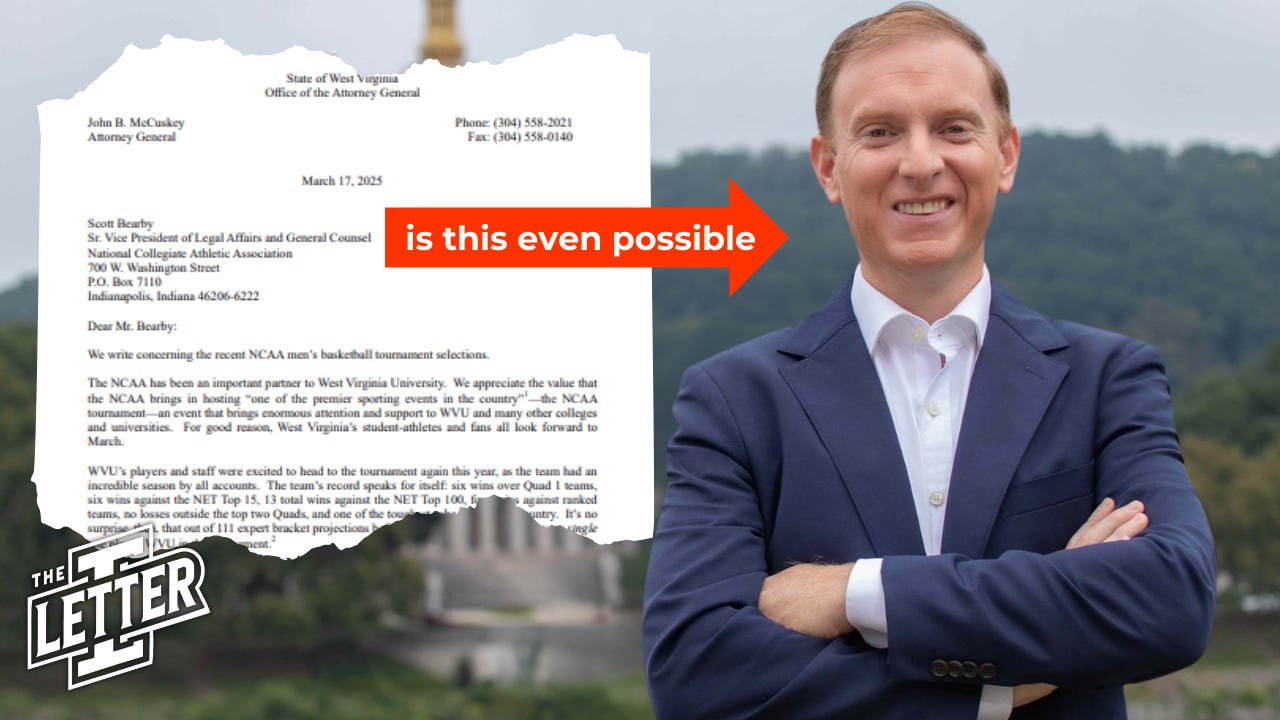March Madness in the Court?: Why Suing Over a Tournament Bid is as Flimsy as a Bubble Team’s Resume
In what world can you sue a national association to create precedent for team selection in March Madness? Our world, apparently.

In what world can you sue a national association to create precedent for team selection in March Madness?
Our world, apparently.
"The Attorney General believes the public deserves to know what objective metrics are used by the committee to ensure the best 68 teams are in the tournament." West Virginia Attorney General John “JB” McCuskey wrote in a letter to Scott Bearby, senior vice president of legal affairs for the NCAA.
This might sound harsh, but if you’re relying on a lawsuit to get into the tournament, you probably weren’t making a deep run anyway. If West Virginia, Boise State, or any other bubble team really deserved it, they should have just won more games. March Madness is about proving it on the court—not in court.
Do we not all know it's just an eye test? If you're whining about your team not looking good on paper the chances are that they're probably not good in the year so far. A team can, yes, make a good run and prove that they're competitors. However, if we turn the NCAA M.M. selection into an objective one, does this not entirely defeat the purpose of regular season statistics and strength of schedule? If that's what you're basing it off of, what are we even doing?
If we forced a fully objective system, it would undermine the whole point of regular-season competition. Teams schedule tough games for a reason—to prove themselves against elite competition. A purely numbers-driven approach could overvalue individual stats or mid-majors that rack up wins against weaker opponents while punishing power conference teams grinding through tough schedules.
For instance, teams in the top 25 of the NET rankings have historically received at-large bids at a rate of nearly 90%, while mid-majors ranked in the 40s or lower are far less likely to get in unless they win their conference tournaments. The committee takes into account quadrant wins, road victories, and even late-season performance—things that raw numbers don't always capture.
And let’s be real—historically, has there ever been a truly egregious snub? Sure, there are always debates, but the teams that miss the cut usually had their chances and just didn’t do enough. If you're left out, it probably means you had flaws that outweighed your case.
It’s not like the committee is a secret society throwing darts at a bracket. There’s a structured voting process, and members recuse themselves from discussions involving their own schools. Could there be bias? Of course—it’s humans making decisions. But that’s why there’s a group, not a single person, making the call.
I will admit, North Carolina should not be in the tournament. Could WVU have taken their spot? Sure. However, West Virginia's inconsistency, especially their inability to rise above .500 on the road, undermines their entire case. Also, they split even in conference play; that meant six teams were ahead of them. They lost ten games to lower ranked opponents, with some of those opponents rising above them in the ranks due to the win.
At the end of the day, the easiest way to avoid this drama is simple: take the decision out of the committee’s hands. Every team has a clear path—win your conference tournament, and you’re in. Complaining about an at-large bid is basically admitting you weren’t good enough to win the games that guaranteed you a spot.
If the government can step in and challenge the selection process for March Madness, what’s next? Suing the College Football Playoff for leaving out an 11-1 team? Taking legal action against the Heisman committee for picking the “wrong” winner? The moment we start litigating sports decisions, we open a potential legal drama fueled hell-hole that extends far beyond basketball.
Look at the bigger picture here—this lawsuit isn’t really about fairness in March Madness. It’s about making a public statement, probably for political clout. If an Attorney General is spending resources on a sports bracket, maybe there are bigger issues they should be focusing on.
by Aiden Brueck




